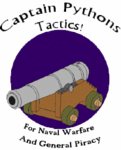
Defining qualities that make good Captain: A ship requires much skill in both operating/fighting a ship, and commanding/leading a ship. Usually it takes a good balance of both sides of the spectrum to be a good Captain. Let us explore the world of what a Captain has to have to be a good Captain. Handling Skills It usually requires a good seaman to become a Captain. One example of this is Captain Kid. When he started out, he was just a man looking for a fortune as a privateer. Sailors don't commonly respect commanders and officers with no idea on how to sail a vessel. But there are exceptions to the rule that a good seaman is needed. Lord Nelson (referring to the Lord Nelson from the Napoleonic Wars) was not considered a great seaman, but a good leader. A ship requires many things:
-
Proper Navigation: A vessel can be easily loose it's way, and until the 20th Century, navigation techniques are not so reliable and easy as you think.
-
Keeping Supplies in Check: It is crucial that a good amount of food, water, ammunition, medical supplies, armory, repair tools, spare sail and spars, and much more is kept on ship. If one of the above is not aboard ship, it can make life difficult on ship.
-
Repair: The Seamen and Carpenters from the 16th Century to the 19th Century have been known for their skill in being able to fix anything on a ship, if they have the right tools, supplies, and most important of all, leadership. Being able to know what and how to fix something on a ship is important to the upkeep of the ship and keeping good sailing qualities in a ship.
-
Gunnery: In a sea battle, guns usually play the crucial part in the battle. They can slow a ship, kill off an enemy crew, and even sink opponents. Knowing what targets you should go for and when to hit them can decide the outcome of a battle.
-
Fighting: If the captain plans to board a ship, knowing where and how to attack a ship is necessary for taking a ship successfully. Also having a private skill in fighting is good in defending yourself in battle against a possible opponent.
But these are all material things. A lot more is needed than just material knowledge. Captain Bligh of the Bounty knew how to operate a ship, but he lacked some leadership skills. Leadership Skills Leadership is seen all around us everyday. A leader at sea's responsibilities is great. He has many responsibilities to his men. The captain has to make sure that they are safe when possible, make sure they are fed and healthy, that they obey orders, that they are satisfied with victory now and then, and they are operating the ship properly.
-
Discipline: Out of all the things captains need, having a crew that obeys orders is the most important. But a captain will have to give out discipline every so often to the men of the crew. The crew is only human, and humans are prone to making mistakes. If a captain gives too little or no discipline the men of the crew will not respect the commander. Seamen expect discipline from their captain; it shows to them the signs of a good commander. But too much discipline can lead the crew to hate and despise the captain and mutiny. A common and well-known example of this is Captain Bligh of the Bounty, who was too strict and gave out too much discipline, and his crew mutinied and left him to die in a boat, 4,000 miles away from a friendly port. But his other good leadership skills helped him make it to safety. Having a good amount (but not to much or too little amount) of discipline is one thing a captain needs.
-
Being Human: A general rule of being human is that you aren't perfect and you don't necessarily know everything. But a leader should be able to admit to himself that he is not perfect or all knowing. A good leader should also know to surround himself with people who know what and how to do things he doesn't. This might come up to electing officers for a ship in material skills.
-
Taking Risks: A leader should be able to take risks. If a leader always goes the way of safety, nothing will happen. But sometimes taking a risk is necessary to achieve victory, and a leader should know when it is good to take risks. Here is an example: If you are a pirate, and you see a rich Spanish Galleon on the horizon, you sail toward it. But when you get within 5 miles of the Galleon, you see a heavy escort ship that is by far superior to you. But he is a very far way off. There is a chance you can take the Galleon still being able to avoid the escort in time. But then again, he might catch up and smash you. You have to make the decision, to take the risk or not. If you do, you can become rich. If you don't, another chance might not come like this again. You never know, you might even be able to deal with the escort if it does come up, or trick it. It all depends on that moment's decision.
-
Tactician/Decision Maker: Being a tactician is sort of a material skill relation. But a captain should be able to strategize what the best course it is to take in battle and in sailing to achieve the best result. What cannons should be fired when, and at what? Who should board the enemy ship? Where do we board? Should we tack again or not? Should we take out another reef in the main topsail? A Tactician is basically being a good decision maker. The term of tactician really comes in battle.
-
Courage and Setting an Example: Especially in battle, showing courage can inspire men, but doesn't necessarily mean a good commander. Courage usually is not something you try to attempt; that is how people get killed. But doing something that is necessary and dangerous is considered courage. Courage is more or less setting a good example. Men will respect you if you do your job to the best of your ability, and do it correctly. The men will do the same in return. One thing that is seen in some leaders is that he would never send men into something he would never get into (like a fight). But sometimes commanders take this too much out of proportion, or do it at the wrong time and are killed. Setting a good example is the key.
-
Cooperating with your Officers: Being able to work with officers is a good thing. They are your assistants, and a captain probably can't handle a ship on your own. Having officers that don't know what they are doing, who don't follow orders, can't follow out their duties, and/or don't respect their commander are the bad aspects of officers. On the other hand, if the commander treats his officers bad, it can be hard. Officers and Captains that work together can operate a ship better.
All these skills and more are needed to become a good commander or captain. Good leaders don't just pop out of anywhere, nor are people born leaders. Leaders are made from proper teaching and experience. To find a good leader is a difficult search. There are leaders, then good leaders. Anyone can try to be and actually become a leader, but a good one requires a search of a person's being.

















